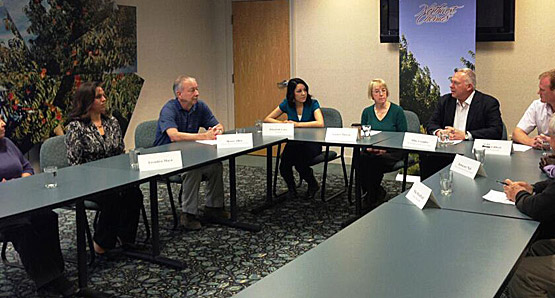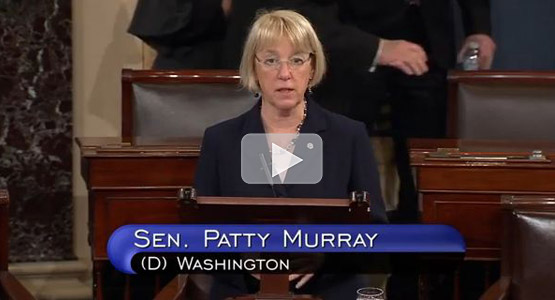On Tuesday, as the Pentagon’s annual report on sexual assault showed an alarming increase in assaults on servicemembers, I joined Senator Kelly Ayotte (R-NH) to introduce the Combating Military Sexual Assault (MSA) Act of 2013. In an effort to reduce sexual assaults within the military and help the victims of this crime, the Combating MSA Act would address a number of gaps within current law and policy and build upon the positive steps the U.S. Department of Defense (DoD) has taken in recent years. According to DoD estimates, there were roughly 19,000 cases of military sexual assault in 2011 alone. Of these, only 3,192 were reported, leaving thousands of victims to face the aftermath alone as their assailants escape justice. That number rose to 26,000 cases in 2012 with less than 3,400 of those cases being reported.
When our best and our brightest put on a uniform and join the United States Armed Forces, they do so with the understanding that they will sacrifice much in the name of defending our country and its people. However, it’s unconscionable to think that suffering from unwanted sexual contact within the ranks is now part of that equation. Not only are we subjecting our men and women to this disgusting epidemic, but we’re also failing to provide the victims with any meaningful support system once they have fallen victim to these attacks. And while I applaud recent efforts by the Department of Defense to turn the tide on this mounting crisis, we must do more to root out the culture that fosters this behavior and provide substantive assistance to those who face these tragedies alone. I am proud to join Senator Ayotte in introducing the Combating Military Sexual Assault Act to reverse this trend and establish the necessary means for victims to take action against their attackers. It’s inexcusable for us to wait any longer to address this issue and I’m glad this bipartisan legislation is taking meaningful steps to do right by our nation’s heroes.
“Murray proposal would reform military sex assault trials, empower prevention office”
– The News Tribune
“Sen. Murray working to stem tide of military sexual assault” – KOMO
Social Service Providers, Scientific Researchers in Washington State Feeling the Impacts of Sequestration

Last week, I returned to Washington to meet with constituents and hear firsthand how sequestration is impacting their lives. In Everett, Bremerton, and Yakima, I sat down with social service providers to discuss the impacts of sequestration on the communities they serve. I also met with advocates, patients, and researchers at the Fred Hutchinson Cancer Research Center in Seattle to discuss the impacts of sequestration on scientific research. At each of these events, I continued to stress the need for a balanced approach to addressing our current budget challenges that takes into consideration the need to invest in the middle-class and the resources that will help Washington state grow. I will use the stories I heard at these events to continue fighting for a balanced approach in the other Washington.
“Seattle researchers fear federal cuts will cost lives and jobs”
– Puget Sound Business Journal
“Sequestration’s cuts hit hardest behind headlines, agencies say”
– The Everett Herald
Continuing the Push for Comprehensive Immigration Reform

Last week, I travelled to Yakima to host a roundtable discussion on the importance of comprehensive immigration reform. At the Washington State Fruit Commission, I met with representatives from the agriculture industry, immigration reform advocates, students hoping to attend college through the DREAM Act, and families that have been impacted by the current immigration system. It is not enough to look at statistics and reports that do not get to the heart of why we need reform — it’s real life stories and tough challenges that people in Washington state face that matter most to me. I will use the stories I heard at the roundtable to continue fighting for immigration reform in Washington, D.C.
“U.S. Senator talks immigration reform in Yakima” – KIMA
“Murray says immigration bill best that Senate can do” – The Yakima Herald
Inaction Not an Option on Common Sense Gun Control

I’m disappointed that we were prevented from taking even the most basic step to keep guns out of the hands of dangerous individuals when the Senate voted down the Manchin-Toomey bill a few weeks ago. For me, and for 90% of the American people – the bipartisan Manchin-Toomey bill is common sense. Today, background checks for guns are only required when a gun is purchased from a federally-licensed firearms dealer. Yet we know that the vast majority of guns that are used in crimes were not sold by those dealers. And we know that the criminals who used those guns did not undergo background checks.
Manchin-Toomey would put more gun sales through a system that for fourteen years has kept guns out of the hands of convicted felons, domestic violence abusers, and those who are a threat to our communities. It would mean that anyone who wants to buy a gun would undergo a simple, 15 second background check before they take that gun home. Surely, that’s not too much to ask. It makes no sense that it is more difficult to buy an airplane ticket than it is to buy a gun today. It makes no sense that all it takes to buy a gun is cash or an internet connection.
We have witnessed too many horrific acts of gun violence in this country for that to be the case. We must protect our communities and our children from gun violence. And leaders on this issue like Senator Manchin have shown we can take steps to do that while also protecting the second-amendment rights of law-abiding gun owners. Like many across the country, I’m largely at a loss for words when it comes to what happened on the Senate floor a few weeks ago. But I’m also not ready to give up. Too many lives are at stake for inaction to be an option.
“Washington Sen. Patty Murray vows gun control fight to continue despite defeat – KIRO Radio
Literacy Education for All
In April, I introduced my major literacy bill, the Literacy Education for All, Results for the Nation, or the LEARN Act. This bill will provide schools and states with the resources they need to make sure that children from birth to grade twelve have the reading and writing skills necessary for success in school and beyond. Literacy education is the foundation for all education. Children in every state deserve to have access to high quality literacy education that will give them the reading and writing skills they need to succeed in school, in their future careers, and in life. As we work to reauthorize and improve No Child Left Behind, I am going to fight to make sure literacy education gets the support it deserves. The LEARN Act would make a significant investment in literacy education across the country. In Washington state, for example, the federal literacy funding would go from $6 million last school year, to an estimated $34 million under the LEARN Act.
Twitter Round-up





